AIPC COUCOP801A Assessment 1, 2, 3 & 4: Counselling Practice Review
VerifiedAdded on 2022/10/08
|51
|16824
|33
Homework Assignment
AI Summary
This document presents an assessment of a counselling case study, focusing on the McLeod family and their challenges. The assessment, part of the COUCOP801A unit at the Australian Institute of Professional Counsellors (AIPC), examines the initial needs and concerns of the family, potential strengths within their ecosystem, and the urgency and complexity of their needs. The student, Sue Pullen, was marked NYC (Not Yet Competent) and provided a resubmission. The assessment includes an evaluation of the primary role of a mental health counsellor, the importance of family involvement, and the need for a collaborative approach. Part A focuses on the counsellor's initial actions, including gathering information and building rapport, while Part B delves into the family's needs, resources, and communication patterns. The assessment highlights the importance of understanding the family's perspective, addressing their concerns, and developing a plan for intervention. The feedback emphasizes the need for correct APA referencing and the inclusion of personal stances with rationales.
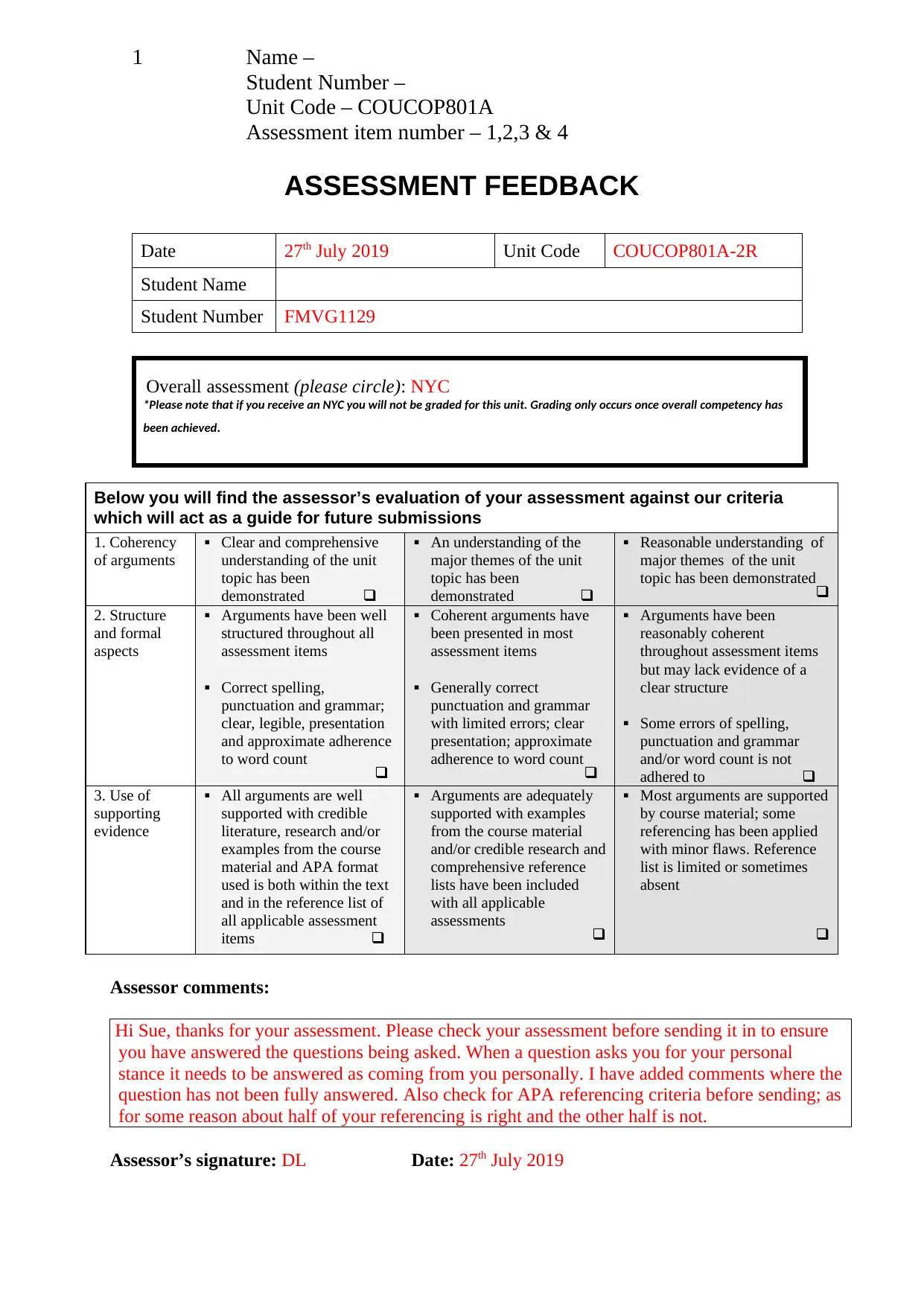
1 Name –
Student Number –
Unit Code – COUCOP801A
Assessment item number – 1,2,3 & 4
ASSESSMENT FEEDBACK
Date 27th July 2019 Unit Code COUCOP801A-2R
Student Name
Student Number FMVG1129
Overall assessment (please circle): NYC
*Please note that if you receive an NYC you will not be graded for this unit. Grading only occurs once overall competency has
been achieved.
Below you will find the assessor’s evaluation of your assessment against our criteria
which will act as a guide for future submissions
1. Coherency
of arguments
Clear and comprehensive
understanding of the unit
topic has been
demonstrated
An understanding of the
major themes of the unit
topic has been
demonstrated
Reasonable understanding of
major themes of the unit
topic has been demonstrated
2. Structure
and formal
aspects
Arguments have been well
structured throughout all
assessment items
Correct spelling,
punctuation and grammar;
clear, legible, presentation
and approximate adherence
to word count
Coherent arguments have
been presented in most
assessment items
Generally correct
punctuation and grammar
with limited errors; clear
presentation; approximate
adherence to word count
Arguments have been
reasonably coherent
throughout assessment items
but may lack evidence of a
clear structure
Some errors of spelling,
punctuation and grammar
and/or word count is not
adhered to
3. Use of
supporting
evidence
All arguments are well
supported with credible
literature, research and/or
examples from the course
material and APA format
used is both within the text
and in the reference list of
all applicable assessment
items
Arguments are adequately
supported with examples
from the course material
and/or credible research and
comprehensive reference
lists have been included
with all applicable
assessments
Most arguments are supported
by course material; some
referencing has been applied
with minor flaws. Reference
list is limited or sometimes
absent
Assessor comments:
Hi Sue, thanks for your assessment. Please check your assessment before sending it in to ensure
you have answered the questions being asked. When a question asks you for your personal
stance it needs to be answered as coming from you personally. I have added comments where the
question has not been fully answered. Also check for APA referencing criteria before sending; as
for some reason about half of your referencing is right and the other half is not.
Assessor’s signature: DL Date: 27th July 2019
Student Number –
Unit Code – COUCOP801A
Assessment item number – 1,2,3 & 4
ASSESSMENT FEEDBACK
Date 27th July 2019 Unit Code COUCOP801A-2R
Student Name
Student Number FMVG1129
Overall assessment (please circle): NYC
*Please note that if you receive an NYC you will not be graded for this unit. Grading only occurs once overall competency has
been achieved.
Below you will find the assessor’s evaluation of your assessment against our criteria
which will act as a guide for future submissions
1. Coherency
of arguments
Clear and comprehensive
understanding of the unit
topic has been
demonstrated
An understanding of the
major themes of the unit
topic has been
demonstrated
Reasonable understanding of
major themes of the unit
topic has been demonstrated
2. Structure
and formal
aspects
Arguments have been well
structured throughout all
assessment items
Correct spelling,
punctuation and grammar;
clear, legible, presentation
and approximate adherence
to word count
Coherent arguments have
been presented in most
assessment items
Generally correct
punctuation and grammar
with limited errors; clear
presentation; approximate
adherence to word count
Arguments have been
reasonably coherent
throughout assessment items
but may lack evidence of a
clear structure
Some errors of spelling,
punctuation and grammar
and/or word count is not
adhered to
3. Use of
supporting
evidence
All arguments are well
supported with credible
literature, research and/or
examples from the course
material and APA format
used is both within the text
and in the reference list of
all applicable assessment
items
Arguments are adequately
supported with examples
from the course material
and/or credible research and
comprehensive reference
lists have been included
with all applicable
assessments
Most arguments are supported
by course material; some
referencing has been applied
with minor flaws. Reference
list is limited or sometimes
absent
Assessor comments:
Hi Sue, thanks for your assessment. Please check your assessment before sending it in to ensure
you have answered the questions being asked. When a question asks you for your personal
stance it needs to be answered as coming from you personally. I have added comments where the
question has not been fully answered. Also check for APA referencing criteria before sending; as
for some reason about half of your referencing is right and the other half is not.
Assessor’s signature: DL Date: 27th July 2019
Paraphrase This Document
Need a fresh take? Get an instant paraphrase of this document with our AI Paraphraser
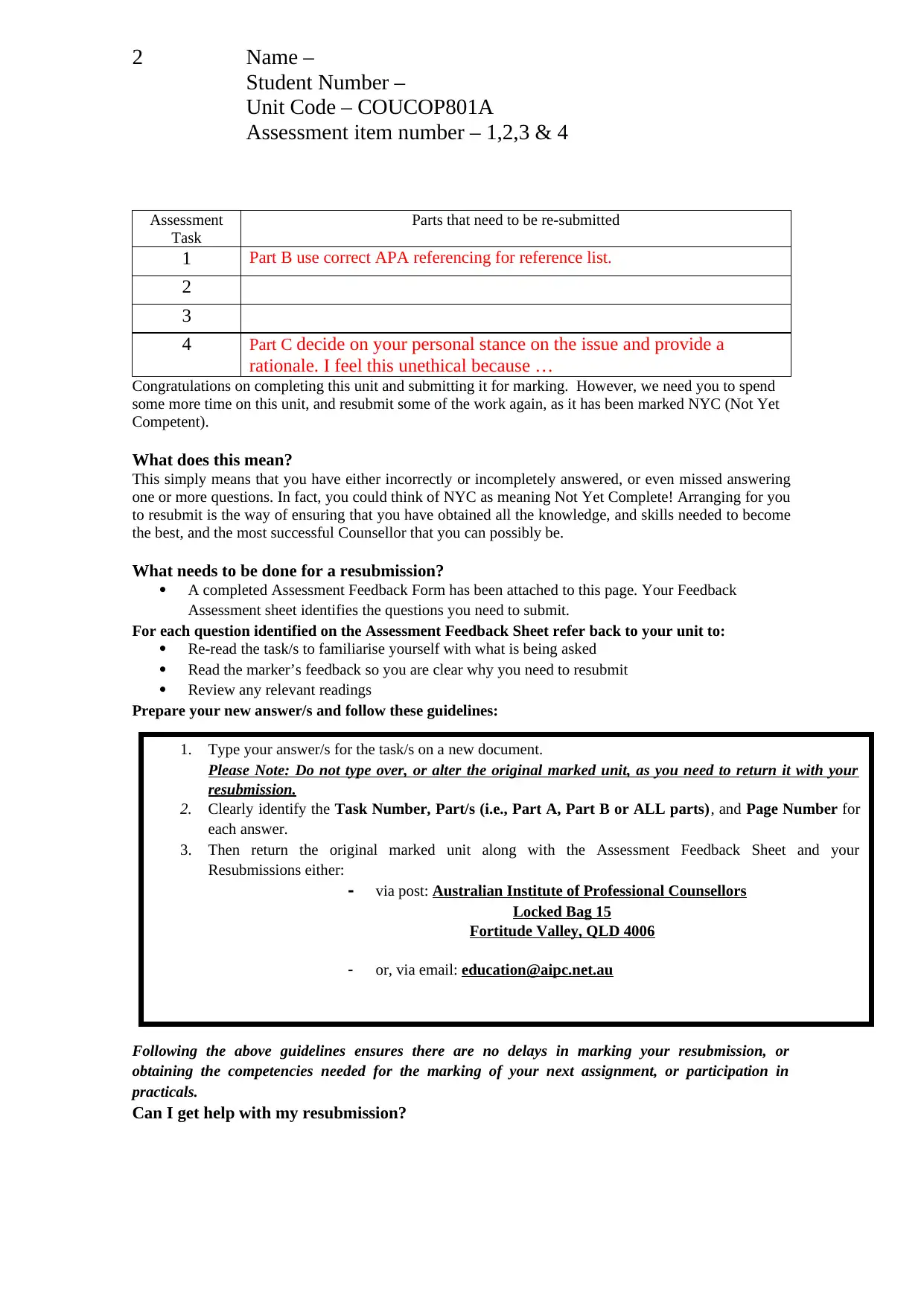
2 Name –
Student Number –
Unit Code – COUCOP801A
Assessment item number – 1,2,3 & 4
Assessment
Task
Parts that need to be re-submitted
1 Part B use correct APA referencing for reference list.
2
3
4 Part C decide on your personal stance on the issue and provide a
rationale. I feel this unethical because …
Congratulations on completing this unit and submitting it for marking. However, we need you to spend
some more time on this unit, and resubmit some of the work again, as it has been marked NYC (Not Yet
Competent).
What does this mean?
This simply means that you have either incorrectly or incompletely answered, or even missed answering
one or more questions. In fact, you could think of NYC as meaning Not Yet Complete! Arranging for you
to resubmit is the way of ensuring that you have obtained all the knowledge, and skills needed to become
the best, and the most successful Counsellor that you can possibly be.
What needs to be done for a resubmission?
A completed Assessment Feedback Form has been attached to this page. Your Feedback
Assessment sheet identifies the questions you need to submit.
For each question identified on the Assessment Feedback Sheet refer back to your unit to:
Re-read the task/s to familiarise yourself with what is being asked
Read the marker’s feedback so you are clear why you need to resubmit
Review any relevant readings
Prepare your new answer/s and follow these guidelines:
Following the above guidelines ensures there are no delays in marking your resubmission, or
obtaining the competencies needed for the marking of your next assignment, or participation in
practicals.
Can I get help with my resubmission?
1. Type your answer/s for the task/s on a new document.
Please Note: Do not type over, or alter the original marked unit, as you need to return it with your
resubmission.
2. Clearly identify the Task Number, Part/s (i.e., Part A, Part B or ALL parts), and Page Number for
each answer.
3. Then return the original marked unit along with the Assessment Feedback Sheet and your
Resubmissions either:
- via post: Australian Institute of Professional Counsellors
Locked Bag 15
Fortitude Valley, QLD 4006
- or, via email: education@aipc.net.au
Student Number –
Unit Code – COUCOP801A
Assessment item number – 1,2,3 & 4
Assessment
Task
Parts that need to be re-submitted
1 Part B use correct APA referencing for reference list.
2
3
4 Part C decide on your personal stance on the issue and provide a
rationale. I feel this unethical because …
Congratulations on completing this unit and submitting it for marking. However, we need you to spend
some more time on this unit, and resubmit some of the work again, as it has been marked NYC (Not Yet
Competent).
What does this mean?
This simply means that you have either incorrectly or incompletely answered, or even missed answering
one or more questions. In fact, you could think of NYC as meaning Not Yet Complete! Arranging for you
to resubmit is the way of ensuring that you have obtained all the knowledge, and skills needed to become
the best, and the most successful Counsellor that you can possibly be.
What needs to be done for a resubmission?
A completed Assessment Feedback Form has been attached to this page. Your Feedback
Assessment sheet identifies the questions you need to submit.
For each question identified on the Assessment Feedback Sheet refer back to your unit to:
Re-read the task/s to familiarise yourself with what is being asked
Read the marker’s feedback so you are clear why you need to resubmit
Review any relevant readings
Prepare your new answer/s and follow these guidelines:
Following the above guidelines ensures there are no delays in marking your resubmission, or
obtaining the competencies needed for the marking of your next assignment, or participation in
practicals.
Can I get help with my resubmission?
1. Type your answer/s for the task/s on a new document.
Please Note: Do not type over, or alter the original marked unit, as you need to return it with your
resubmission.
2. Clearly identify the Task Number, Part/s (i.e., Part A, Part B or ALL parts), and Page Number for
each answer.
3. Then return the original marked unit along with the Assessment Feedback Sheet and your
Resubmissions either:
- via post: Australian Institute of Professional Counsellors
Locked Bag 15
Fortitude Valley, QLD 4006
- or, via email: education@aipc.net.au
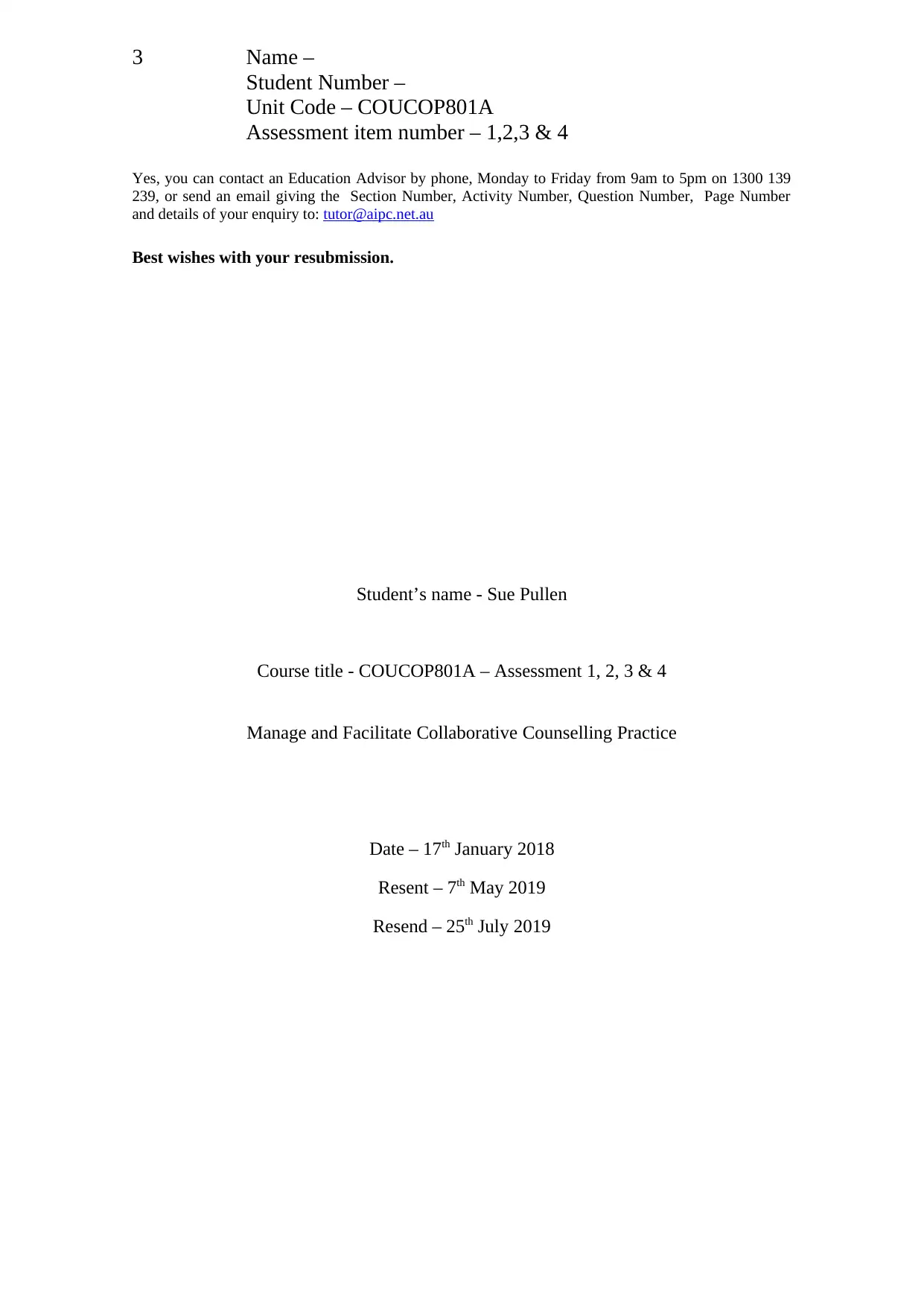
3 Name –
Student Number –
Unit Code – COUCOP801A
Assessment item number – 1,2,3 & 4
Yes, you can contact an Education Advisor by phone, Monday to Friday from 9am to 5pm on 1300 139
239, or send an email giving the Section Number, Activity Number, Question Number, Page Number
and details of your enquiry to: tutor@aipc.net.au
Best wishes with your resubmission.
Student’s name - Sue Pullen
Course title - COUCOP801A – Assessment 1, 2, 3 & 4
Manage and Facilitate Collaborative Counselling Practice
Date – 17th January 2018
Resent – 7th May 2019
Resend – 25th July 2019
Student Number –
Unit Code – COUCOP801A
Assessment item number – 1,2,3 & 4
Yes, you can contact an Education Advisor by phone, Monday to Friday from 9am to 5pm on 1300 139
239, or send an email giving the Section Number, Activity Number, Question Number, Page Number
and details of your enquiry to: tutor@aipc.net.au
Best wishes with your resubmission.
Student’s name - Sue Pullen
Course title - COUCOP801A – Assessment 1, 2, 3 & 4
Manage and Facilitate Collaborative Counselling Practice
Date – 17th January 2018
Resent – 7th May 2019
Resend – 25th July 2019
⊘ This is a preview!⊘
Do you want full access?
Subscribe today to unlock all pages.

Trusted by 1+ million students worldwide
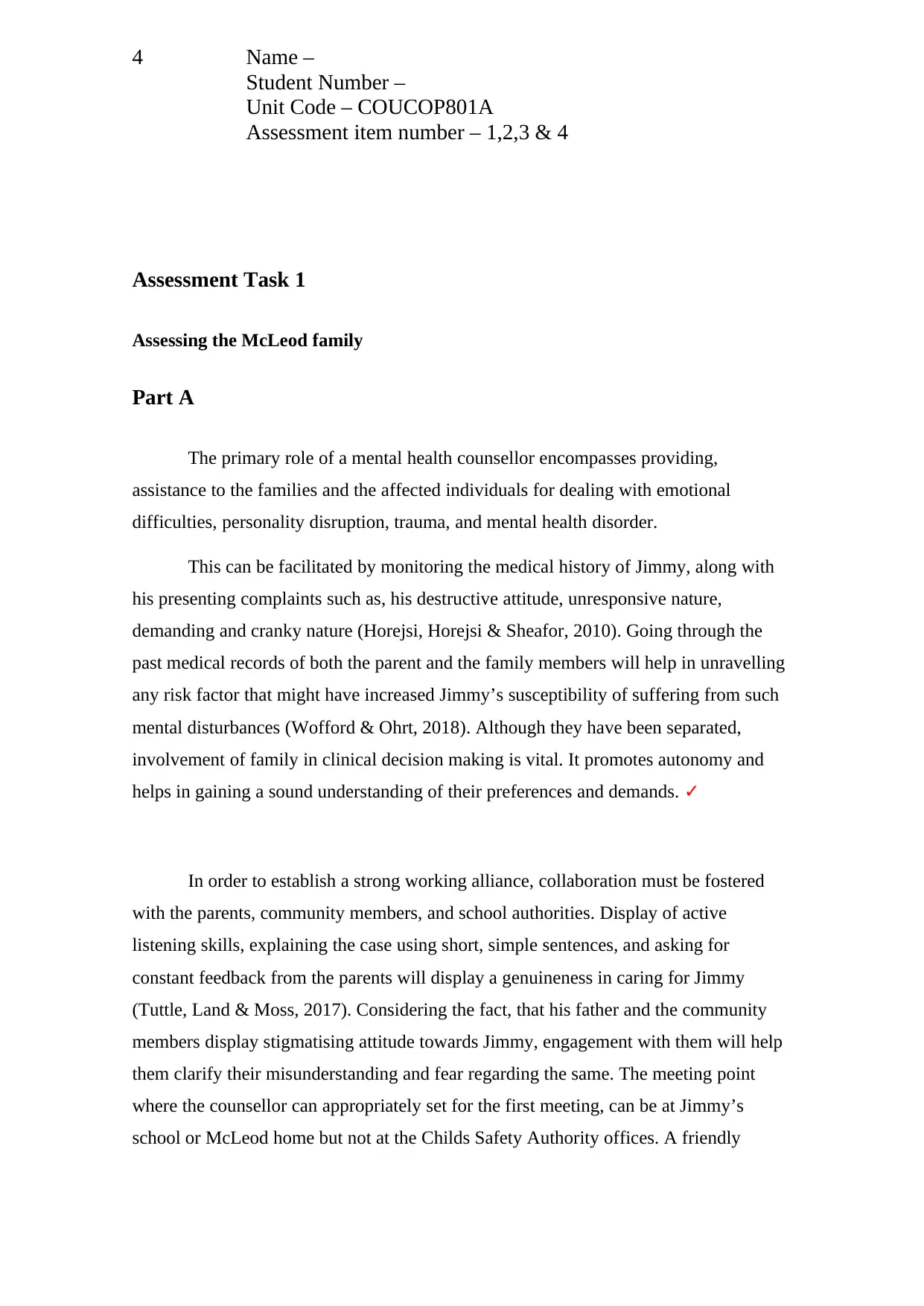
4 Name –
Student Number –
Unit Code – COUCOP801A
Assessment item number – 1,2,3 & 4
Assessment Task 1
Assessing the McLeod family
Part A
The primary role of a mental health counsellor encompasses providing,
assistance to the families and the affected individuals for dealing with emotional
difficulties, personality disruption, trauma, and mental health disorder.
This can be facilitated by monitoring the medical history of Jimmy, along with
his presenting complaints such as, his destructive attitude, unresponsive nature,
demanding and cranky nature (Horejsi, Horejsi & Sheafor, 2010). Going through the
past medical records of both the parent and the family members will help in unravelling
any risk factor that might have increased Jimmy’s susceptibility of suffering from such
mental disturbances (Wofford & Ohrt, 2018). Although they have been separated,
involvement of family in clinical decision making is vital. It promotes autonomy and
helps in gaining a sound understanding of their preferences and demands. ✓
In order to establish a strong working alliance, collaboration must be fostered
with the parents, community members, and school authorities. Display of active
listening skills, explaining the case using short, simple sentences, and asking for
constant feedback from the parents will display a genuineness in caring for Jimmy
(Tuttle, Land & Moss, 2017). Considering the fact, that his father and the community
members display stigmatising attitude towards Jimmy, engagement with them will help
them clarify their misunderstanding and fear regarding the same. The meeting point
where the counsellor can appropriately set for the first meeting, can be at Jimmy’s
school or McLeod home but not at the Childs Safety Authority offices. A friendly
Student Number –
Unit Code – COUCOP801A
Assessment item number – 1,2,3 & 4
Assessment Task 1
Assessing the McLeod family
Part A
The primary role of a mental health counsellor encompasses providing,
assistance to the families and the affected individuals for dealing with emotional
difficulties, personality disruption, trauma, and mental health disorder.
This can be facilitated by monitoring the medical history of Jimmy, along with
his presenting complaints such as, his destructive attitude, unresponsive nature,
demanding and cranky nature (Horejsi, Horejsi & Sheafor, 2010). Going through the
past medical records of both the parent and the family members will help in unravelling
any risk factor that might have increased Jimmy’s susceptibility of suffering from such
mental disturbances (Wofford & Ohrt, 2018). Although they have been separated,
involvement of family in clinical decision making is vital. It promotes autonomy and
helps in gaining a sound understanding of their preferences and demands. ✓
In order to establish a strong working alliance, collaboration must be fostered
with the parents, community members, and school authorities. Display of active
listening skills, explaining the case using short, simple sentences, and asking for
constant feedback from the parents will display a genuineness in caring for Jimmy
(Tuttle, Land & Moss, 2017). Considering the fact, that his father and the community
members display stigmatising attitude towards Jimmy, engagement with them will help
them clarify their misunderstanding and fear regarding the same. The meeting point
where the counsellor can appropriately set for the first meeting, can be at Jimmy’s
school or McLeod home but not at the Childs Safety Authority offices. A friendly
Paraphrase This Document
Need a fresh take? Get an instant paraphrase of this document with our AI Paraphraser
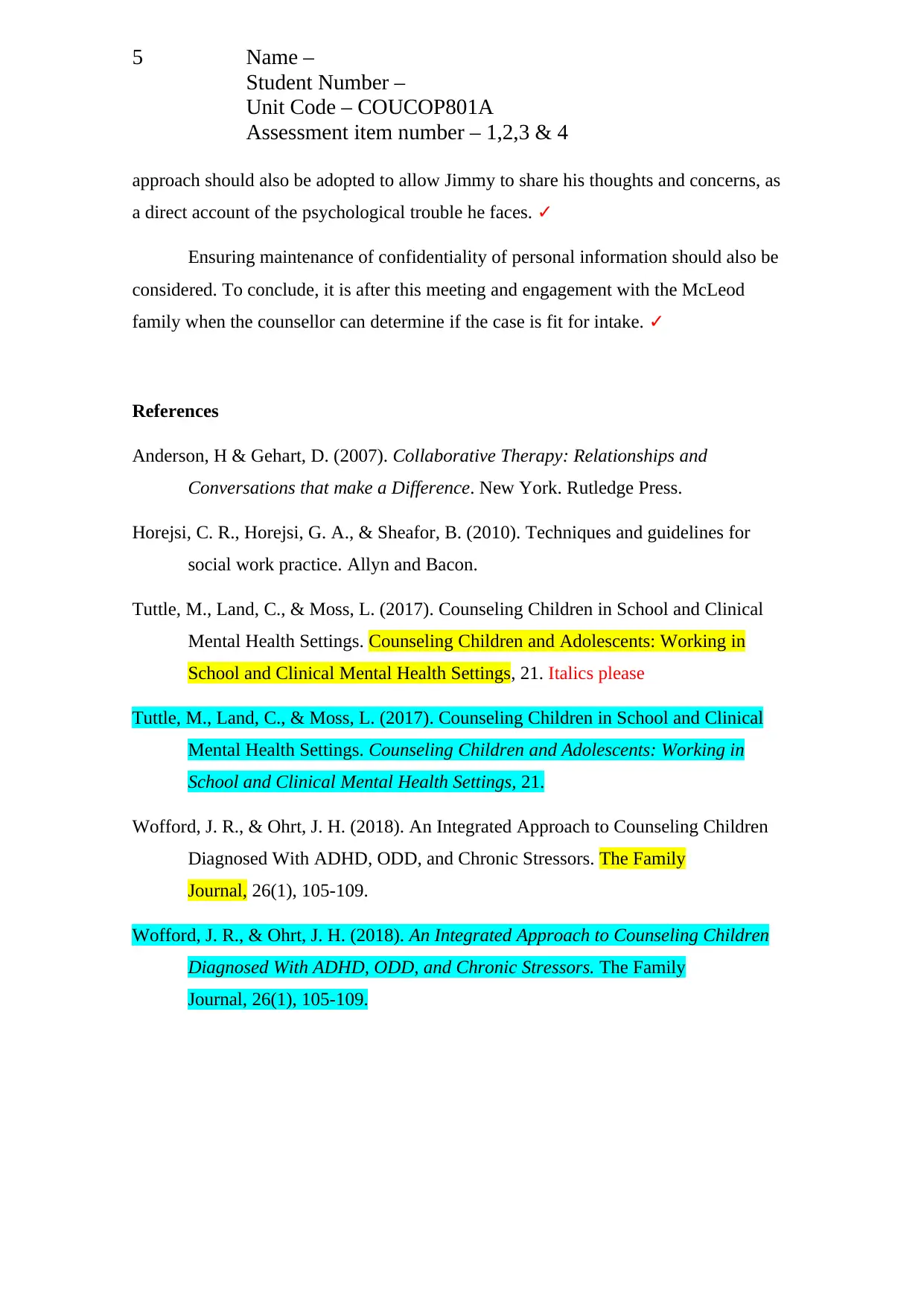
5 Name –
Student Number –
Unit Code – COUCOP801A
Assessment item number – 1,2,3 & 4
approach should also be adopted to allow Jimmy to share his thoughts and concerns, as
a direct account of the psychological trouble he faces. ✓
Ensuring maintenance of confidentiality of personal information should also be
considered. To conclude, it is after this meeting and engagement with the McLeod
family when the counsellor can determine if the case is fit for intake. ✓
References
Anderson, H & Gehart, D. (2007). Collaborative Therapy: Relationships and
Conversations that make a Difference. New York. Rutledge Press.
Horejsi, C. R., Horejsi, G. A., & Sheafor, B. (2010). Techniques and guidelines for
social work practice. Allyn and Bacon.
Tuttle, M., Land, C., & Moss, L. (2017). Counseling Children in School and Clinical
Mental Health Settings. Counseling Children and Adolescents: Working in
School and Clinical Mental Health Settings, 21. Italics please
Tuttle, M., Land, C., & Moss, L. (2017). Counseling Children in School and Clinical
Mental Health Settings. Counseling Children and Adolescents: Working in
School and Clinical Mental Health Settings, 21.
Wofford, J. R., & Ohrt, J. H. (2018). An Integrated Approach to Counseling Children
Diagnosed With ADHD, ODD, and Chronic Stressors. The Family
Journal, 26(1), 105-109.
Wofford, J. R., & Ohrt, J. H. (2018). An Integrated Approach to Counseling Children
Diagnosed With ADHD, ODD, and Chronic Stressors. The Family
Journal, 26(1), 105-109.
Student Number –
Unit Code – COUCOP801A
Assessment item number – 1,2,3 & 4
approach should also be adopted to allow Jimmy to share his thoughts and concerns, as
a direct account of the psychological trouble he faces. ✓
Ensuring maintenance of confidentiality of personal information should also be
considered. To conclude, it is after this meeting and engagement with the McLeod
family when the counsellor can determine if the case is fit for intake. ✓
References
Anderson, H & Gehart, D. (2007). Collaborative Therapy: Relationships and
Conversations that make a Difference. New York. Rutledge Press.
Horejsi, C. R., Horejsi, G. A., & Sheafor, B. (2010). Techniques and guidelines for
social work practice. Allyn and Bacon.
Tuttle, M., Land, C., & Moss, L. (2017). Counseling Children in School and Clinical
Mental Health Settings. Counseling Children and Adolescents: Working in
School and Clinical Mental Health Settings, 21. Italics please
Tuttle, M., Land, C., & Moss, L. (2017). Counseling Children in School and Clinical
Mental Health Settings. Counseling Children and Adolescents: Working in
School and Clinical Mental Health Settings, 21.
Wofford, J. R., & Ohrt, J. H. (2018). An Integrated Approach to Counseling Children
Diagnosed With ADHD, ODD, and Chronic Stressors. The Family
Journal, 26(1), 105-109.
Wofford, J. R., & Ohrt, J. H. (2018). An Integrated Approach to Counseling Children
Diagnosed With ADHD, ODD, and Chronic Stressors. The Family
Journal, 26(1), 105-109.
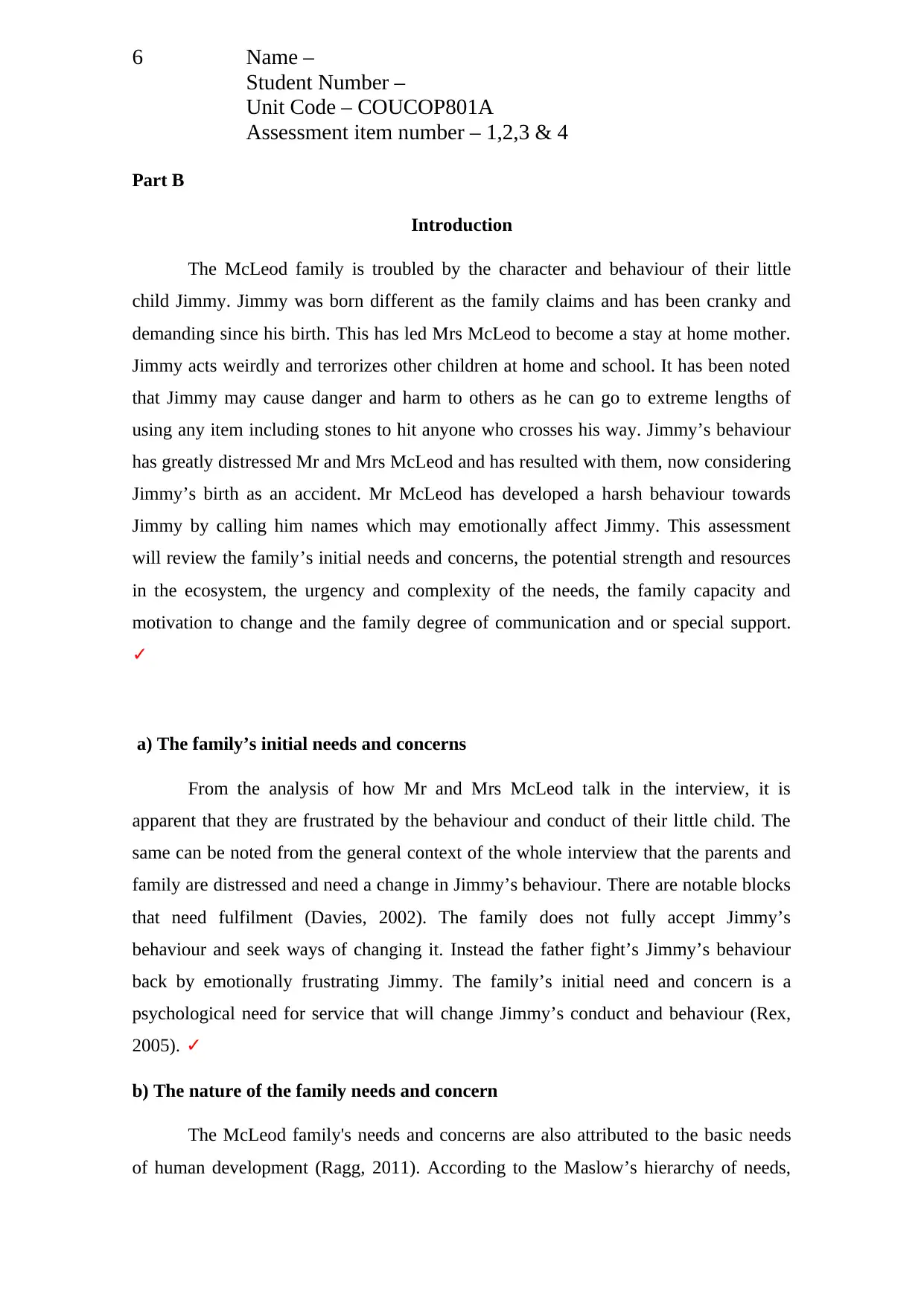
6 Name –
Student Number –
Unit Code – COUCOP801A
Assessment item number – 1,2,3 & 4
Part B
Introduction
The McLeod family is troubled by the character and behaviour of their little
child Jimmy. Jimmy was born different as the family claims and has been cranky and
demanding since his birth. This has led Mrs McLeod to become a stay at home mother.
Jimmy acts weirdly and terrorizes other children at home and school. It has been noted
that Jimmy may cause danger and harm to others as he can go to extreme lengths of
using any item including stones to hit anyone who crosses his way. Jimmy’s behaviour
has greatly distressed Mr and Mrs McLeod and has resulted with them, now considering
Jimmy’s birth as an accident. Mr McLeod has developed a harsh behaviour towards
Jimmy by calling him names which may emotionally affect Jimmy. This assessment
will review the family’s initial needs and concerns, the potential strength and resources
in the ecosystem, the urgency and complexity of the needs, the family capacity and
motivation to change and the family degree of communication and or special support.
✓
a) The family’s initial needs and concerns
From the analysis of how Mr and Mrs McLeod talk in the interview, it is
apparent that they are frustrated by the behaviour and conduct of their little child. The
same can be noted from the general context of the whole interview that the parents and
family are distressed and need a change in Jimmy’s behaviour. There are notable blocks
that need fulfilment (Davies, 2002). The family does not fully accept Jimmy’s
behaviour and seek ways of changing it. Instead the father fight’s Jimmy’s behaviour
back by emotionally frustrating Jimmy. The family’s initial need and concern is a
psychological need for service that will change Jimmy’s conduct and behaviour (Rex,
2005). ✓
b) The nature of the family needs and concern
The McLeod family's needs and concerns are also attributed to the basic needs
of human development (Ragg, 2011). According to the Maslow’s hierarchy of needs,
Student Number –
Unit Code – COUCOP801A
Assessment item number – 1,2,3 & 4
Part B
Introduction
The McLeod family is troubled by the character and behaviour of their little
child Jimmy. Jimmy was born different as the family claims and has been cranky and
demanding since his birth. This has led Mrs McLeod to become a stay at home mother.
Jimmy acts weirdly and terrorizes other children at home and school. It has been noted
that Jimmy may cause danger and harm to others as he can go to extreme lengths of
using any item including stones to hit anyone who crosses his way. Jimmy’s behaviour
has greatly distressed Mr and Mrs McLeod and has resulted with them, now considering
Jimmy’s birth as an accident. Mr McLeod has developed a harsh behaviour towards
Jimmy by calling him names which may emotionally affect Jimmy. This assessment
will review the family’s initial needs and concerns, the potential strength and resources
in the ecosystem, the urgency and complexity of the needs, the family capacity and
motivation to change and the family degree of communication and or special support.
✓
a) The family’s initial needs and concerns
From the analysis of how Mr and Mrs McLeod talk in the interview, it is
apparent that they are frustrated by the behaviour and conduct of their little child. The
same can be noted from the general context of the whole interview that the parents and
family are distressed and need a change in Jimmy’s behaviour. There are notable blocks
that need fulfilment (Davies, 2002). The family does not fully accept Jimmy’s
behaviour and seek ways of changing it. Instead the father fight’s Jimmy’s behaviour
back by emotionally frustrating Jimmy. The family’s initial need and concern is a
psychological need for service that will change Jimmy’s conduct and behaviour (Rex,
2005). ✓
b) The nature of the family needs and concern
The McLeod family's needs and concerns are also attributed to the basic needs
of human development (Ragg, 2011). According to the Maslow’s hierarchy of needs,
⊘ This is a preview!⊘
Do you want full access?
Subscribe today to unlock all pages.

Trusted by 1+ million students worldwide
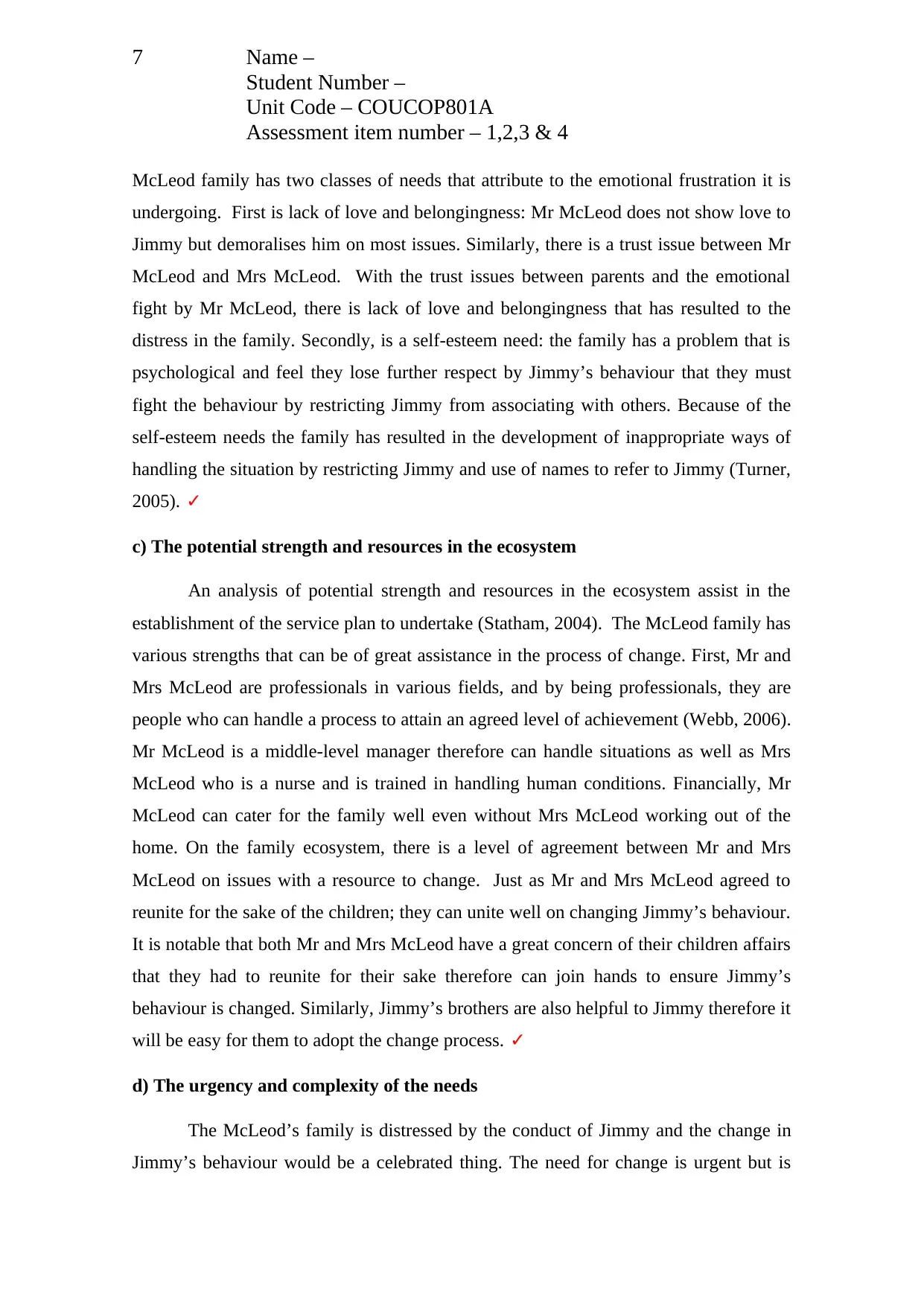
7 Name –
Student Number –
Unit Code – COUCOP801A
Assessment item number – 1,2,3 & 4
McLeod family has two classes of needs that attribute to the emotional frustration it is
undergoing. First is lack of love and belongingness: Mr McLeod does not show love to
Jimmy but demoralises him on most issues. Similarly, there is a trust issue between Mr
McLeod and Mrs McLeod. With the trust issues between parents and the emotional
fight by Mr McLeod, there is lack of love and belongingness that has resulted to the
distress in the family. Secondly, is a self-esteem need: the family has a problem that is
psychological and feel they lose further respect by Jimmy’s behaviour that they must
fight the behaviour by restricting Jimmy from associating with others. Because of the
self-esteem needs the family has resulted in the development of inappropriate ways of
handling the situation by restricting Jimmy and use of names to refer to Jimmy (Turner,
2005). ✓
c) The potential strength and resources in the ecosystem
An analysis of potential strength and resources in the ecosystem assist in the
establishment of the service plan to undertake (Statham, 2004). The McLeod family has
various strengths that can be of great assistance in the process of change. First, Mr and
Mrs McLeod are professionals in various fields, and by being professionals, they are
people who can handle a process to attain an agreed level of achievement (Webb, 2006).
Mr McLeod is a middle-level manager therefore can handle situations as well as Mrs
McLeod who is a nurse and is trained in handling human conditions. Financially, Mr
McLeod can cater for the family well even without Mrs McLeod working out of the
home. On the family ecosystem, there is a level of agreement between Mr and Mrs
McLeod on issues with a resource to change. Just as Mr and Mrs McLeod agreed to
reunite for the sake of the children; they can unite well on changing Jimmy’s behaviour.
It is notable that both Mr and Mrs McLeod have a great concern of their children affairs
that they had to reunite for their sake therefore can join hands to ensure Jimmy’s
behaviour is changed. Similarly, Jimmy’s brothers are also helpful to Jimmy therefore it
will be easy for them to adopt the change process. ✓
d) The urgency and complexity of the needs
The McLeod’s family is distressed by the conduct of Jimmy and the change in
Jimmy’s behaviour would be a celebrated thing. The need for change is urgent but is
Student Number –
Unit Code – COUCOP801A
Assessment item number – 1,2,3 & 4
McLeod family has two classes of needs that attribute to the emotional frustration it is
undergoing. First is lack of love and belongingness: Mr McLeod does not show love to
Jimmy but demoralises him on most issues. Similarly, there is a trust issue between Mr
McLeod and Mrs McLeod. With the trust issues between parents and the emotional
fight by Mr McLeod, there is lack of love and belongingness that has resulted to the
distress in the family. Secondly, is a self-esteem need: the family has a problem that is
psychological and feel they lose further respect by Jimmy’s behaviour that they must
fight the behaviour by restricting Jimmy from associating with others. Because of the
self-esteem needs the family has resulted in the development of inappropriate ways of
handling the situation by restricting Jimmy and use of names to refer to Jimmy (Turner,
2005). ✓
c) The potential strength and resources in the ecosystem
An analysis of potential strength and resources in the ecosystem assist in the
establishment of the service plan to undertake (Statham, 2004). The McLeod family has
various strengths that can be of great assistance in the process of change. First, Mr and
Mrs McLeod are professionals in various fields, and by being professionals, they are
people who can handle a process to attain an agreed level of achievement (Webb, 2006).
Mr McLeod is a middle-level manager therefore can handle situations as well as Mrs
McLeod who is a nurse and is trained in handling human conditions. Financially, Mr
McLeod can cater for the family well even without Mrs McLeod working out of the
home. On the family ecosystem, there is a level of agreement between Mr and Mrs
McLeod on issues with a resource to change. Just as Mr and Mrs McLeod agreed to
reunite for the sake of the children; they can unite well on changing Jimmy’s behaviour.
It is notable that both Mr and Mrs McLeod have a great concern of their children affairs
that they had to reunite for their sake therefore can join hands to ensure Jimmy’s
behaviour is changed. Similarly, Jimmy’s brothers are also helpful to Jimmy therefore it
will be easy for them to adopt the change process. ✓
d) The urgency and complexity of the needs
The McLeod’s family is distressed by the conduct of Jimmy and the change in
Jimmy’s behaviour would be a celebrated thing. The need for change is urgent but is
Paraphrase This Document
Need a fresh take? Get an instant paraphrase of this document with our AI Paraphraser
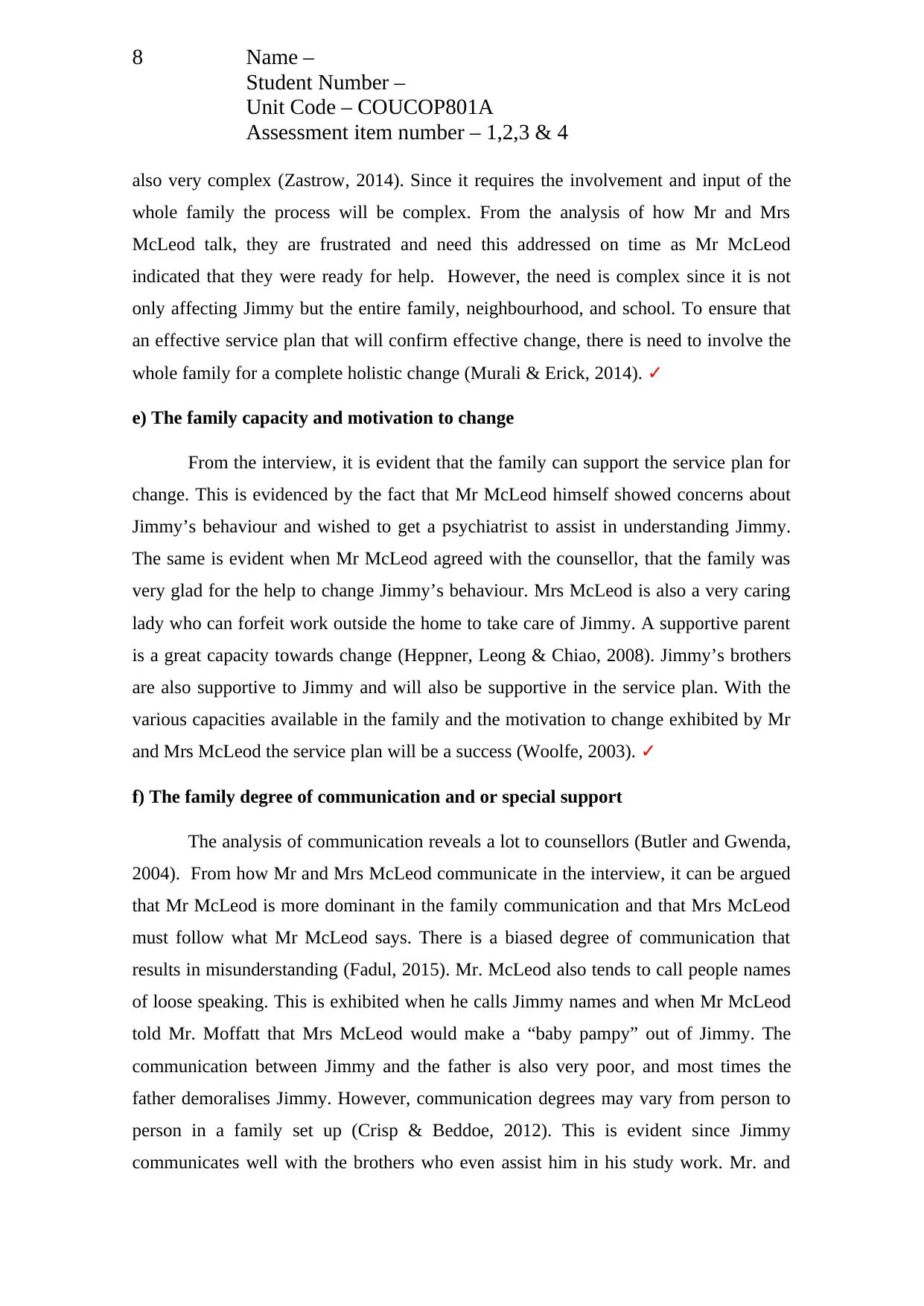
8 Name –
Student Number –
Unit Code – COUCOP801A
Assessment item number – 1,2,3 & 4
also very complex (Zastrow, 2014). Since it requires the involvement and input of the
whole family the process will be complex. From the analysis of how Mr and Mrs
McLeod talk, they are frustrated and need this addressed on time as Mr McLeod
indicated that they were ready for help. However, the need is complex since it is not
only affecting Jimmy but the entire family, neighbourhood, and school. To ensure that
an effective service plan that will confirm effective change, there is need to involve the
whole family for a complete holistic change (Murali & Erick, 2014). ✓
e) The family capacity and motivation to change
From the interview, it is evident that the family can support the service plan for
change. This is evidenced by the fact that Mr McLeod himself showed concerns about
Jimmy’s behaviour and wished to get a psychiatrist to assist in understanding Jimmy.
The same is evident when Mr McLeod agreed with the counsellor, that the family was
very glad for the help to change Jimmy’s behaviour. Mrs McLeod is also a very caring
lady who can forfeit work outside the home to take care of Jimmy. A supportive parent
is a great capacity towards change (Heppner, Leong & Chiao, 2008). Jimmy’s brothers
are also supportive to Jimmy and will also be supportive in the service plan. With the
various capacities available in the family and the motivation to change exhibited by Mr
and Mrs McLeod the service plan will be a success (Woolfe, 2003). ✓
f) The family degree of communication and or special support
The analysis of communication reveals a lot to counsellors (Butler and Gwenda,
2004). From how Mr and Mrs McLeod communicate in the interview, it can be argued
that Mr McLeod is more dominant in the family communication and that Mrs McLeod
must follow what Mr McLeod says. There is a biased degree of communication that
results in misunderstanding (Fadul, 2015). Mr. McLeod also tends to call people names
of loose speaking. This is exhibited when he calls Jimmy names and when Mr McLeod
told Mr. Moffatt that Mrs McLeod would make a “baby pampy” out of Jimmy. The
communication between Jimmy and the father is also very poor, and most times the
father demoralises Jimmy. However, communication degrees may vary from person to
person in a family set up (Crisp & Beddoe, 2012). This is evident since Jimmy
communicates well with the brothers who even assist him in his study work. Mr. and
Student Number –
Unit Code – COUCOP801A
Assessment item number – 1,2,3 & 4
also very complex (Zastrow, 2014). Since it requires the involvement and input of the
whole family the process will be complex. From the analysis of how Mr and Mrs
McLeod talk, they are frustrated and need this addressed on time as Mr McLeod
indicated that they were ready for help. However, the need is complex since it is not
only affecting Jimmy but the entire family, neighbourhood, and school. To ensure that
an effective service plan that will confirm effective change, there is need to involve the
whole family for a complete holistic change (Murali & Erick, 2014). ✓
e) The family capacity and motivation to change
From the interview, it is evident that the family can support the service plan for
change. This is evidenced by the fact that Mr McLeod himself showed concerns about
Jimmy’s behaviour and wished to get a psychiatrist to assist in understanding Jimmy.
The same is evident when Mr McLeod agreed with the counsellor, that the family was
very glad for the help to change Jimmy’s behaviour. Mrs McLeod is also a very caring
lady who can forfeit work outside the home to take care of Jimmy. A supportive parent
is a great capacity towards change (Heppner, Leong & Chiao, 2008). Jimmy’s brothers
are also supportive to Jimmy and will also be supportive in the service plan. With the
various capacities available in the family and the motivation to change exhibited by Mr
and Mrs McLeod the service plan will be a success (Woolfe, 2003). ✓
f) The family degree of communication and or special support
The analysis of communication reveals a lot to counsellors (Butler and Gwenda,
2004). From how Mr and Mrs McLeod communicate in the interview, it can be argued
that Mr McLeod is more dominant in the family communication and that Mrs McLeod
must follow what Mr McLeod says. There is a biased degree of communication that
results in misunderstanding (Fadul, 2015). Mr. McLeod also tends to call people names
of loose speaking. This is exhibited when he calls Jimmy names and when Mr McLeod
told Mr. Moffatt that Mrs McLeod would make a “baby pampy” out of Jimmy. The
communication between Jimmy and the father is also very poor, and most times the
father demoralises Jimmy. However, communication degrees may vary from person to
person in a family set up (Crisp & Beddoe, 2012). This is evident since Jimmy
communicates well with the brothers who even assist him in his study work. Mr. and
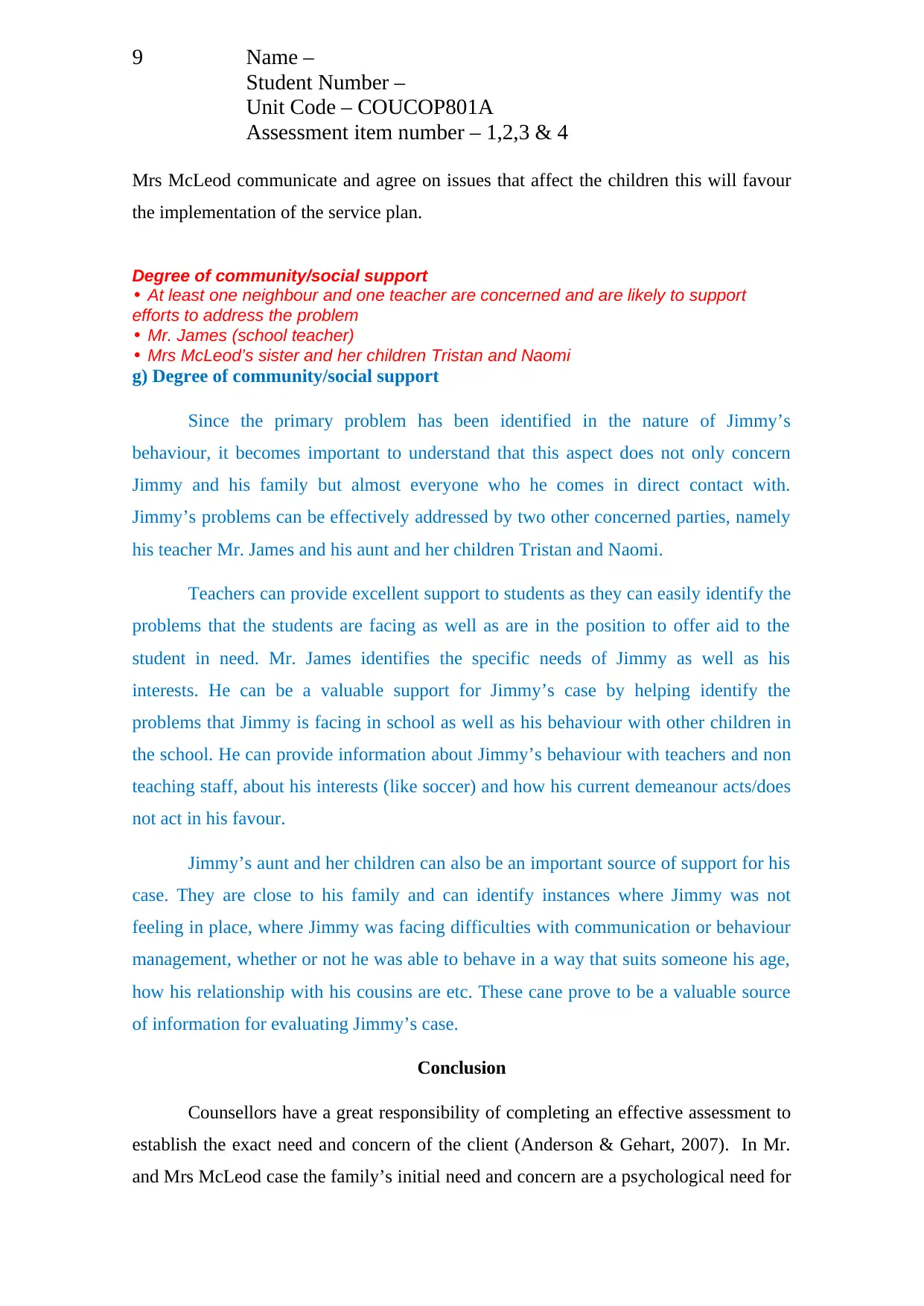
9 Name –
Student Number –
Unit Code – COUCOP801A
Assessment item number – 1,2,3 & 4
Mrs McLeod communicate and agree on issues that affect the children this will favour
the implementation of the service plan.
Degree of community/social support
• At least one neighbour and one teacher are concerned and are likely to support
efforts to address the problem
• Mr. James (school teacher)
• Mrs McLeod’s sister and her children Tristan and Naomi
g) Degree of community/social support
Since the primary problem has been identified in the nature of Jimmy’s
behaviour, it becomes important to understand that this aspect does not only concern
Jimmy and his family but almost everyone who he comes in direct contact with.
Jimmy’s problems can be effectively addressed by two other concerned parties, namely
his teacher Mr. James and his aunt and her children Tristan and Naomi.
Teachers can provide excellent support to students as they can easily identify the
problems that the students are facing as well as are in the position to offer aid to the
student in need. Mr. James identifies the specific needs of Jimmy as well as his
interests. He can be a valuable support for Jimmy’s case by helping identify the
problems that Jimmy is facing in school as well as his behaviour with other children in
the school. He can provide information about Jimmy’s behaviour with teachers and non
teaching staff, about his interests (like soccer) and how his current demeanour acts/does
not act in his favour.
Jimmy’s aunt and her children can also be an important source of support for his
case. They are close to his family and can identify instances where Jimmy was not
feeling in place, where Jimmy was facing difficulties with communication or behaviour
management, whether or not he was able to behave in a way that suits someone his age,
how his relationship with his cousins are etc. These cane prove to be a valuable source
of information for evaluating Jimmy’s case.
Conclusion
Counsellors have a great responsibility of completing an effective assessment to
establish the exact need and concern of the client (Anderson & Gehart, 2007). In Mr.
and Mrs McLeod case the family’s initial need and concern are a psychological need for
Student Number –
Unit Code – COUCOP801A
Assessment item number – 1,2,3 & 4
Mrs McLeod communicate and agree on issues that affect the children this will favour
the implementation of the service plan.
Degree of community/social support
• At least one neighbour and one teacher are concerned and are likely to support
efforts to address the problem
• Mr. James (school teacher)
• Mrs McLeod’s sister and her children Tristan and Naomi
g) Degree of community/social support
Since the primary problem has been identified in the nature of Jimmy’s
behaviour, it becomes important to understand that this aspect does not only concern
Jimmy and his family but almost everyone who he comes in direct contact with.
Jimmy’s problems can be effectively addressed by two other concerned parties, namely
his teacher Mr. James and his aunt and her children Tristan and Naomi.
Teachers can provide excellent support to students as they can easily identify the
problems that the students are facing as well as are in the position to offer aid to the
student in need. Mr. James identifies the specific needs of Jimmy as well as his
interests. He can be a valuable support for Jimmy’s case by helping identify the
problems that Jimmy is facing in school as well as his behaviour with other children in
the school. He can provide information about Jimmy’s behaviour with teachers and non
teaching staff, about his interests (like soccer) and how his current demeanour acts/does
not act in his favour.
Jimmy’s aunt and her children can also be an important source of support for his
case. They are close to his family and can identify instances where Jimmy was not
feeling in place, where Jimmy was facing difficulties with communication or behaviour
management, whether or not he was able to behave in a way that suits someone his age,
how his relationship with his cousins are etc. These cane prove to be a valuable source
of information for evaluating Jimmy’s case.
Conclusion
Counsellors have a great responsibility of completing an effective assessment to
establish the exact need and concern of the client (Anderson & Gehart, 2007). In Mr.
and Mrs McLeod case the family’s initial need and concern are a psychological need for
⊘ This is a preview!⊘
Do you want full access?
Subscribe today to unlock all pages.

Trusted by 1+ million students worldwide
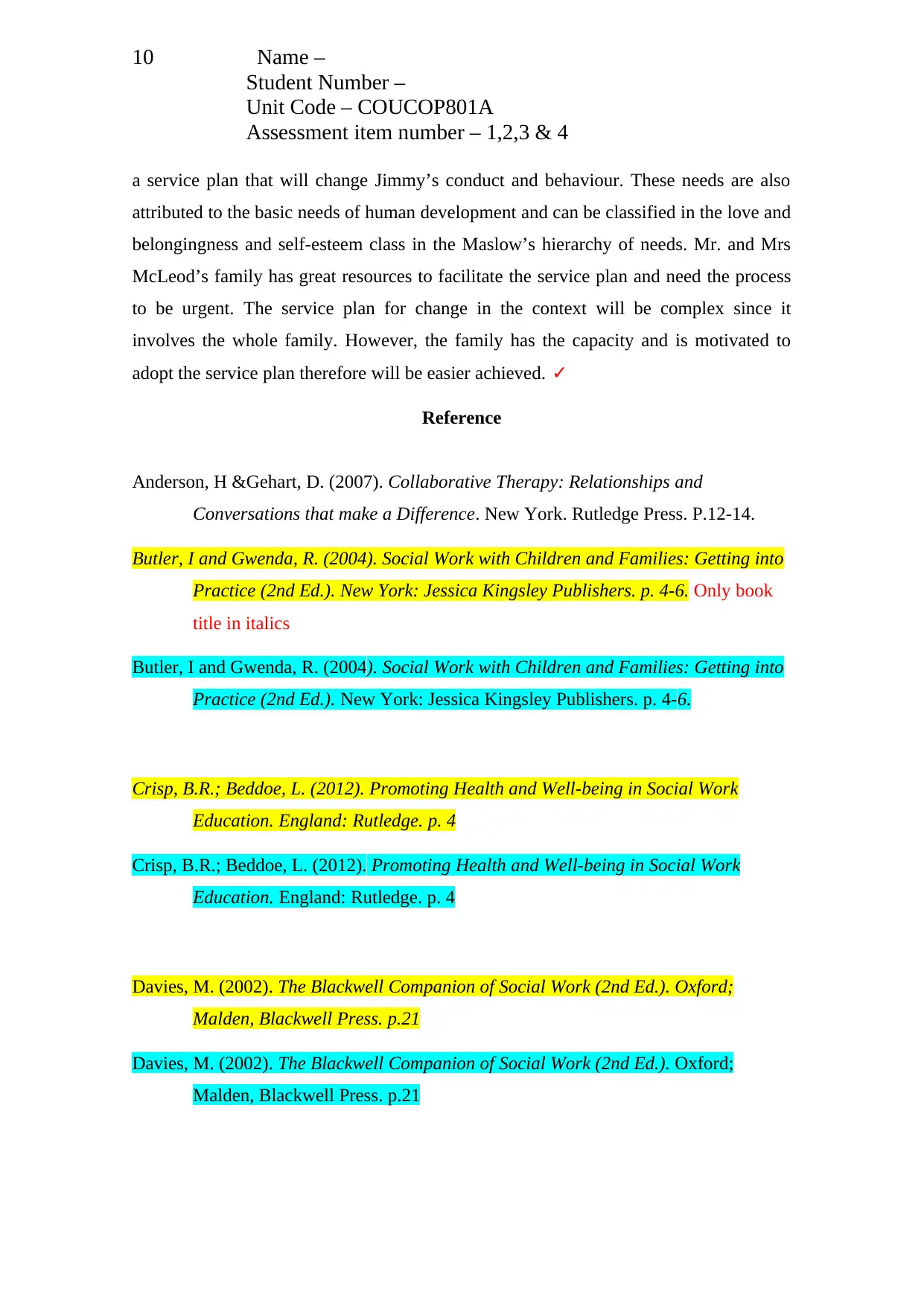
10 Name –
Student Number –
Unit Code – COUCOP801A
Assessment item number – 1,2,3 & 4
a service plan that will change Jimmy’s conduct and behaviour. These needs are also
attributed to the basic needs of human development and can be classified in the love and
belongingness and self-esteem class in the Maslow’s hierarchy of needs. Mr. and Mrs
McLeod’s family has great resources to facilitate the service plan and need the process
to be urgent. The service plan for change in the context will be complex since it
involves the whole family. However, the family has the capacity and is motivated to
adopt the service plan therefore will be easier achieved. ✓
Reference
Anderson, H &Gehart, D. (2007). Collaborative Therapy: Relationships and
Conversations that make a Difference. New York. Rutledge Press. P.12-14.
Butler, I and Gwenda, R. (2004). Social Work with Children and Families: Getting into
Practice (2nd Ed.). New York: Jessica Kingsley Publishers. p. 4-6. Only book
title in italics
Butler, I and Gwenda, R. (2004). Social Work with Children and Families: Getting into
Practice (2nd Ed.). New York: Jessica Kingsley Publishers. p. 4-6.
Crisp, B.R.; Beddoe, L. (2012). Promoting Health and Well-being in Social Work
Education. England: Rutledge. p. 4
Crisp, B.R.; Beddoe, L. (2012). Promoting Health and Well-being in Social Work
Education. England: Rutledge. p. 4
Davies, M. (2002). The Blackwell Companion of Social Work (2nd Ed.). Oxford;
Malden, Blackwell Press. p.21
Davies, M. (2002). The Blackwell Companion of Social Work (2nd Ed.). Oxford;
Malden, Blackwell Press. p.21
Student Number –
Unit Code – COUCOP801A
Assessment item number – 1,2,3 & 4
a service plan that will change Jimmy’s conduct and behaviour. These needs are also
attributed to the basic needs of human development and can be classified in the love and
belongingness and self-esteem class in the Maslow’s hierarchy of needs. Mr. and Mrs
McLeod’s family has great resources to facilitate the service plan and need the process
to be urgent. The service plan for change in the context will be complex since it
involves the whole family. However, the family has the capacity and is motivated to
adopt the service plan therefore will be easier achieved. ✓
Reference
Anderson, H &Gehart, D. (2007). Collaborative Therapy: Relationships and
Conversations that make a Difference. New York. Rutledge Press. P.12-14.
Butler, I and Gwenda, R. (2004). Social Work with Children and Families: Getting into
Practice (2nd Ed.). New York: Jessica Kingsley Publishers. p. 4-6. Only book
title in italics
Butler, I and Gwenda, R. (2004). Social Work with Children and Families: Getting into
Practice (2nd Ed.). New York: Jessica Kingsley Publishers. p. 4-6.
Crisp, B.R.; Beddoe, L. (2012). Promoting Health and Well-being in Social Work
Education. England: Rutledge. p. 4
Crisp, B.R.; Beddoe, L. (2012). Promoting Health and Well-being in Social Work
Education. England: Rutledge. p. 4
Davies, M. (2002). The Blackwell Companion of Social Work (2nd Ed.). Oxford;
Malden, Blackwell Press. p.21
Davies, M. (2002). The Blackwell Companion of Social Work (2nd Ed.). Oxford;
Malden, Blackwell Press. p.21
Paraphrase This Document
Need a fresh take? Get an instant paraphrase of this document with our AI Paraphraser
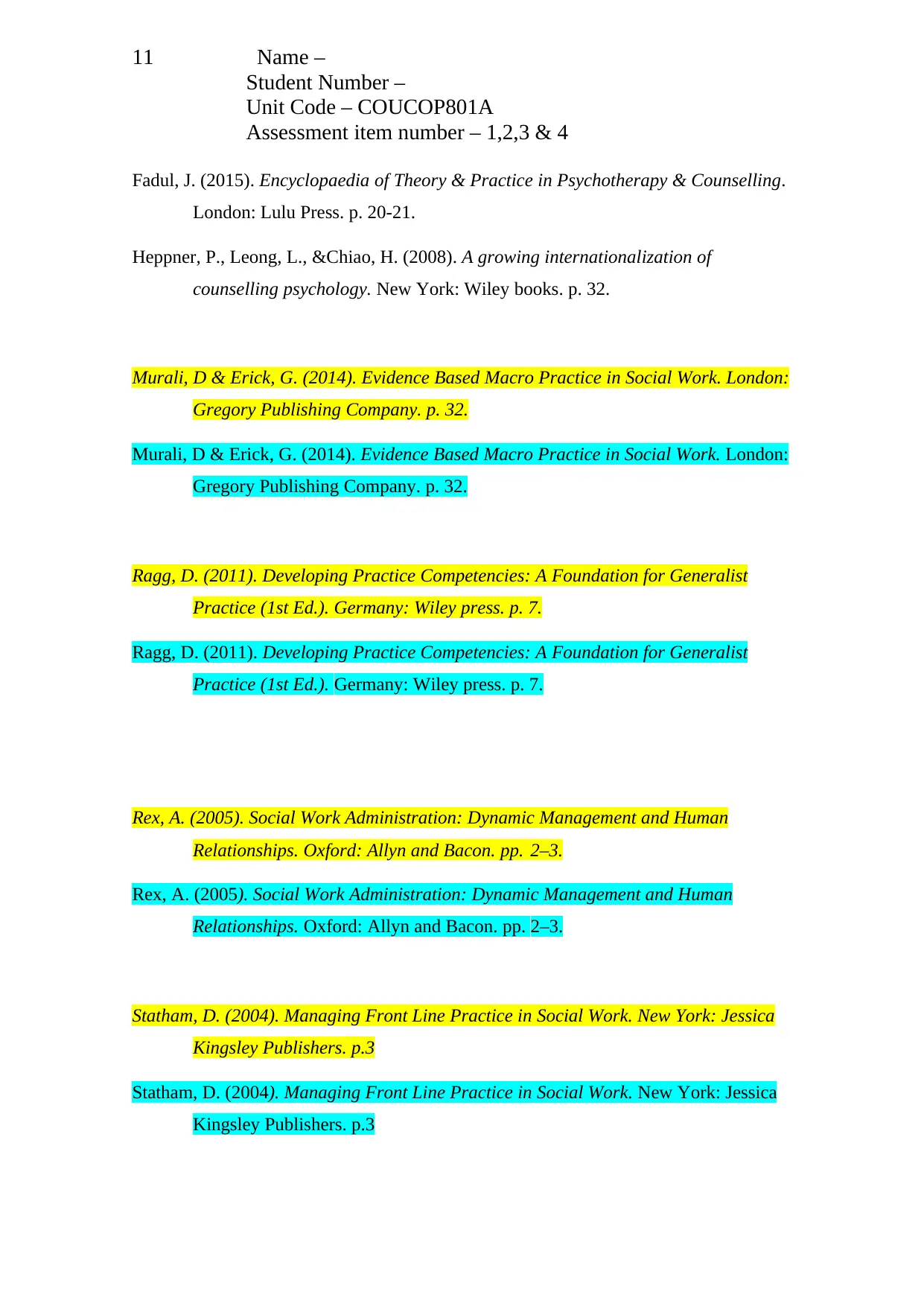
11 Name –
Student Number –
Unit Code – COUCOP801A
Assessment item number – 1,2,3 & 4
Fadul, J. (2015). Encyclopaedia of Theory & Practice in Psychotherapy & Counselling.
London: Lulu Press. p. 20-21.
Heppner, P., Leong, L., &Chiao, H. (2008). A growing internationalization of
counselling psychology. New York: Wiley books. p. 32.
Murali, D & Erick, G. (2014). Evidence Based Macro Practice in Social Work. London:
Gregory Publishing Company. p. 32.
Murali, D & Erick, G. (2014). Evidence Based Macro Practice in Social Work. London:
Gregory Publishing Company. p. 32.
Ragg, D. (2011). Developing Practice Competencies: A Foundation for Generalist
Practice (1st Ed.). Germany: Wiley press. p. 7.
Ragg, D. (2011). Developing Practice Competencies: A Foundation for Generalist
Practice (1st Ed.). Germany: Wiley press. p. 7.
Rex, A. (2005). Social Work Administration: Dynamic Management and Human
Relationships. Oxford: Allyn and Bacon. pp. 2–3.
Rex, A. (2005). Social Work Administration: Dynamic Management and Human
Relationships. Oxford: Allyn and Bacon. pp. 2–3.
Statham, D. (2004). Managing Front Line Practice in Social Work. New York: Jessica
Kingsley Publishers. p.3
Statham, D. (2004). Managing Front Line Practice in Social Work. New York: Jessica
Kingsley Publishers. p.3
Student Number –
Unit Code – COUCOP801A
Assessment item number – 1,2,3 & 4
Fadul, J. (2015). Encyclopaedia of Theory & Practice in Psychotherapy & Counselling.
London: Lulu Press. p. 20-21.
Heppner, P., Leong, L., &Chiao, H. (2008). A growing internationalization of
counselling psychology. New York: Wiley books. p. 32.
Murali, D & Erick, G. (2014). Evidence Based Macro Practice in Social Work. London:
Gregory Publishing Company. p. 32.
Murali, D & Erick, G. (2014). Evidence Based Macro Practice in Social Work. London:
Gregory Publishing Company. p. 32.
Ragg, D. (2011). Developing Practice Competencies: A Foundation for Generalist
Practice (1st Ed.). Germany: Wiley press. p. 7.
Ragg, D. (2011). Developing Practice Competencies: A Foundation for Generalist
Practice (1st Ed.). Germany: Wiley press. p. 7.
Rex, A. (2005). Social Work Administration: Dynamic Management and Human
Relationships. Oxford: Allyn and Bacon. pp. 2–3.
Rex, A. (2005). Social Work Administration: Dynamic Management and Human
Relationships. Oxford: Allyn and Bacon. pp. 2–3.
Statham, D. (2004). Managing Front Line Practice in Social Work. New York: Jessica
Kingsley Publishers. p.3
Statham, D. (2004). Managing Front Line Practice in Social Work. New York: Jessica
Kingsley Publishers. p.3
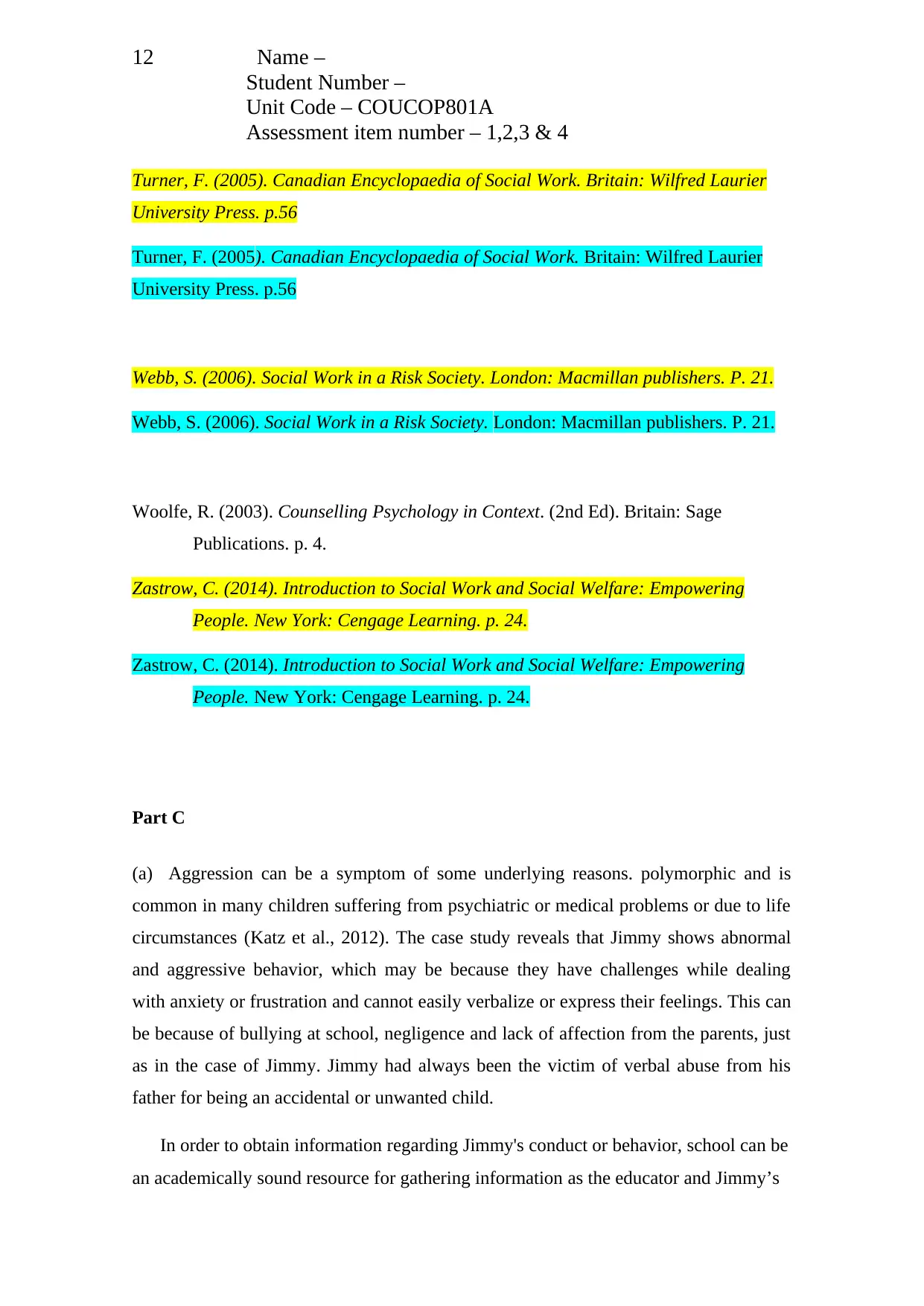
12 Name –
Student Number –
Unit Code – COUCOP801A
Assessment item number – 1,2,3 & 4
Turner, F. (2005). Canadian Encyclopaedia of Social Work. Britain: Wilfred Laurier
University Press. p.56
Turner, F. (2005). Canadian Encyclopaedia of Social Work. Britain: Wilfred Laurier
University Press. p.56
Webb, S. (2006). Social Work in a Risk Society. London: Macmillan publishers. P. 21.
Webb, S. (2006). Social Work in a Risk Society. London: Macmillan publishers. P. 21.
Woolfe, R. (2003). Counselling Psychology in Context. (2nd Ed). Britain: Sage
Publications. p. 4.
Zastrow, C. (2014). Introduction to Social Work and Social Welfare: Empowering
People. New York: Cengage Learning. p. 24.
Zastrow, C. (2014). Introduction to Social Work and Social Welfare: Empowering
People. New York: Cengage Learning. p. 24.
Part C
(a) Aggression can be a symptom of some underlying reasons. polymorphic and is
common in many children suffering from psychiatric or medical problems or due to life
circumstances (Katz et al., 2012). The case study reveals that Jimmy shows abnormal
and aggressive behavior, which may be because they have challenges while dealing
with anxiety or frustration and cannot easily verbalize or express their feelings. This can
be because of bullying at school, negligence and lack of affection from the parents, just
as in the case of Jimmy. Jimmy had always been the victim of verbal abuse from his
father for being an accidental or unwanted child.
In order to obtain information regarding Jimmy's conduct or behavior, school can be
an academically sound resource for gathering information as the educator and Jimmy’s
Student Number –
Unit Code – COUCOP801A
Assessment item number – 1,2,3 & 4
Turner, F. (2005). Canadian Encyclopaedia of Social Work. Britain: Wilfred Laurier
University Press. p.56
Turner, F. (2005). Canadian Encyclopaedia of Social Work. Britain: Wilfred Laurier
University Press. p.56
Webb, S. (2006). Social Work in a Risk Society. London: Macmillan publishers. P. 21.
Webb, S. (2006). Social Work in a Risk Society. London: Macmillan publishers. P. 21.
Woolfe, R. (2003). Counselling Psychology in Context. (2nd Ed). Britain: Sage
Publications. p. 4.
Zastrow, C. (2014). Introduction to Social Work and Social Welfare: Empowering
People. New York: Cengage Learning. p. 24.
Zastrow, C. (2014). Introduction to Social Work and Social Welfare: Empowering
People. New York: Cengage Learning. p. 24.
Part C
(a) Aggression can be a symptom of some underlying reasons. polymorphic and is
common in many children suffering from psychiatric or medical problems or due to life
circumstances (Katz et al., 2012). The case study reveals that Jimmy shows abnormal
and aggressive behavior, which may be because they have challenges while dealing
with anxiety or frustration and cannot easily verbalize or express their feelings. This can
be because of bullying at school, negligence and lack of affection from the parents, just
as in the case of Jimmy. Jimmy had always been the victim of verbal abuse from his
father for being an accidental or unwanted child.
In order to obtain information regarding Jimmy's conduct or behavior, school can be
an academically sound resource for gathering information as the educator and Jimmy’s
⊘ This is a preview!⊘
Do you want full access?
Subscribe today to unlock all pages.

Trusted by 1+ million students worldwide
1 out of 51
Related Documents
Your All-in-One AI-Powered Toolkit for Academic Success.
+13062052269
info@desklib.com
Available 24*7 on WhatsApp / Email
![[object Object]](/_next/static/media/star-bottom.7253800d.svg)
Unlock your academic potential
Copyright © 2020–2026 A2Z Services. All Rights Reserved. Developed and managed by ZUCOL.





